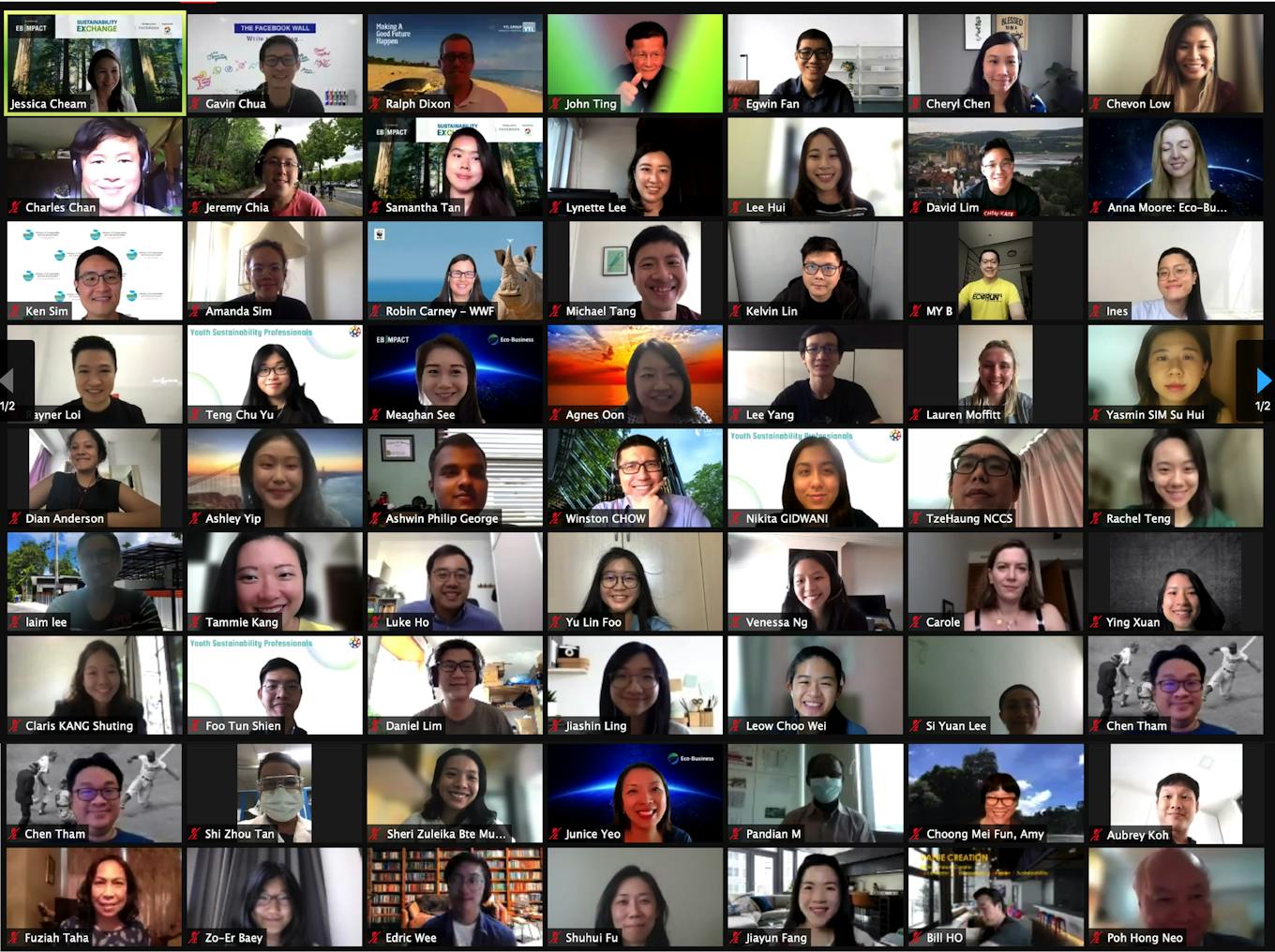EB Impact concluded its inaugural mentorship programme on 25 May with an event showcasing a selection of five ideas, with youths and mentors that took part in the initiative sharing their experiences.
To continue reading, subscribe to Eco‑Business.
There's something for everyone. We offer a range of subscription plans.
- Access our stories and receive our Insights Weekly newsletter with the free EB Member plan.
- Unlock unlimited access to our content and archive with EB Circle.
- Publish your content with EB Premium.
The programme — run in partnership with Facebook and supported by the Climate Action SG Alliance — is the first of its kind in Singapore and aims to harness ideas from young people to help drive sustainability innovation in the city-state.
The youth of today are unprecedentedly empowered. From being the world’s most powerful consumers to harnessing social media to amplify peer influence, they will play an increasingly critical role in reshaping an uncertain world beset with urgent environmental and social issues. By 2030, the United Nations estimates that the number of youths defined as persons aged 15 to 24 years will have grown by 7 per cent to nearly 1.3 billion.
But more needs to be done to incorporate the voice of youths into the climate conversation. “We see a lot of passion and interest for sustainability in the youth, which is necessary. But in order to move the needle, we need much more than just passion,” said Cheryl Chen, director of corporate responsibility and sustainability at Asia Pacific S&P Global, at the closing event.
Sustainability Exchange
EB Impact, the non-profit sister organisation of Asia’s leading media organisation on sustainable development, Eco-Business, aims to deliver training programmes to Asia Pacific’s underserved communities to generate positive social impact, with three strategic areas of focus in mind: education, youth, and nature-based solutions.
As part of EB Impact’s youth strategy, 80 young people and 21 mentors were selected from over 200 hundred applicants to work on solving problem statements under the guidance of seasoned sustainability professionals, who helped them navigate through the radically dynamic business and policy landscape.

Evaluating the showcase was a distinguished panel represented by key stakeholders, including Winston Chow, associate professor of science and technology at the Singapore Management University (SMU), Kenneth Sim, director of environmental policy at the Ministry of Sustainability and the Environment (MSE), Facebook strategy manager Sylvia Lee, and founder and managing director of Eco-Business, Jessica Cheam. Image: Eco-Business.
“I was really impressed by the breadth of the topics and the thoughtfulness of the solutions developed,” said Sylvia Lee, sustainability strategy manager at Facebook. “I also appreciate [the participants’] focus on trying to scale the positive social impact that they are creating in the world.”
Ideas ranged from an environmental, social and corporate governance (ESG) investment platform to a card game addressing food waste. One team, mentored by Ralph Dixon, director of environmental investments at YTL Corporation Berhad, a Malaysian infrastructure conglomerate, created a blueprint for sustainable outpatient dialysis centres.
With the healthcare sector being the fifth largest and an often overlooked emitter in the world, Dixon’s team hopes to spark dialogues on integrating it as one of the targeted areas under the SG Green Plan.
Another team, Greenbridge, aims to help small-cap companies disclose more sustainability data using targeted assistance so that investors can make informed decisions to help allocate their funds responsibly.
“We found that small-cap companies have the lowest sustainability reporting average scores, but account for 70 per cent of all listed companies on Singapore’s stock exchange,” said Egwin Fan, leader of Team Greenbridge. “Given that, any improvement in sustainability reporting by this group would have a substantive impact on the overall quality of reporting for the entire market.”
Team Youth Sustainability Professionals wants to help local Small and Medium-Sized Enterprises (SMEs) adopt sustainable business models.
“We plan to partner companies with youths who are interested in sustainability-related careers and provide both parties with certified sustainability training programmes,” said Foo Tun Shien, leader of the team. “Through this initiative, we hope to facilitate the transfer of sustainability knowledge from the more to the less experienced.”
Youth participants found that putting their projects through the stakeholder validation process helped them understand real-world challenges.
“For someone who has not had that exposure before, I found it really helpful to be able to work and network with hundreds of professionals, with the backing of Eco-Business as such a reputable organisation and trusted brand,” said Chevon Low.
Mentors Chen and Dixon commended the youth participants for their dedication to the projects and were impressed by the speed at which the younger generation operates. “I found it challenging to keep up with them and had to put on different shoes to do that, but this meant that our productivity was very high,” Dixon said.
“
We see a lot of passion and interest for sustainability in the youth, which is necessary. But in order to move the needle, we need much more than just passion.
Cheryl Chen, director of corporate responsibility and sustainability, Asia Pacific S&P Global
Realising ideas
Moving forward, teams were strongly encouraged to pursue funding opportunities like the SG Eco Fund. Kenneth Sim of the Ministry of Sustainability and the Environment (MSE) who is also on the grant’s advisory committee, highlighted the need for community engagement in the solutions proposed.
Jessica Cheam, founder and managing director of Eco-Business advised teams “to think about where their unique proposition is, and perhaps prevent the duplication of efforts that already exist. That will usually help pique the interest of potential investors and partners.”
“The big question in my mind is: how do we build something of a revolving door, where we can bring in corporate venture capitals and governments to support the projects that come up from this programme?” asked Facebook’s Gavin Chua, who is looking forward to refining future editions of Sustainability Exchange.
“Hopefully, this can grow into a movement that inspires more youths to take on sustainability careers that will push for great change and impact, whether it’s policy legislation or corporate action,” Cheam said.








